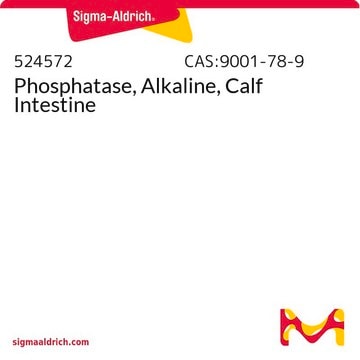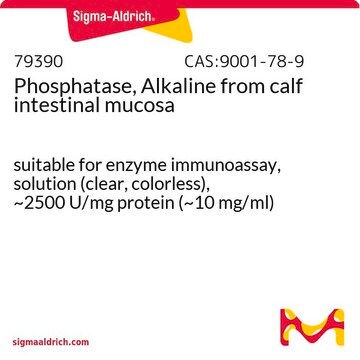P0762
Phosphatase, Alkaline−Agarose from calf intestine
ammonium sulfate suspension
Synonym(s):
Alkaline phosphatase-Agarose
Sign Into View Organizational & Contract Pricing
All Photos(1)
About This Item
Recommended Products
biological source
bovine (calf) intestine
Quality Level
form
ammonium sulfate suspension
specific activity
250-1000 units/mL packed gel
matrix
beaded agarose
storage temp.
2-8°C
Related Categories
General description
Alkaline phosphatase from calf intestine is a glycoprotein with a molecular weight of 140,000.
Application
Alkaline phosphatase from calf intestine, CIP, removes phosphate groups from the 5′ ends of DNA which aids in cloning techniques to keep DNA from self-ligation. It can be inhibited by homoarginine.
Calf intestinal alkaline phosphatase (CIAP) has been used in a study with the spectrophotometric method to assess the inhibition effect of dansyl-L-phenylalanine. It has also been shown that (CIAP) is able to detoxify the lipopolysaccharide (LPS)-mediated inflammatory response, which could be important in the treatment of LPS-mediated diseases.
Biochem/physiol Actions
Sigma insoluble enzymes are produced by reacting the conventional "soluble" enzyme with an inert base that results in an insoluble compound retaining the activity of the original enzyme. Applications are almost unlimited. By selecting the "inert" base carefully, a highly active "resin" or "gel" can be produced with which the enzyme reaction can be quickly catalyzed by momentary contact with the substrate in a suitable medium. This can be carried out either in a batch slurry or even through a small column. In either case, the insoluble enzyme does not remain as a contaminant of the reaction mix. It can be readily filtered or centrifuged out of the batch slurry, or remain behind in the column. Many unstable enzymes seem to be much more stable in the insoluble form.
Packaging
Package size based on DEA units
Unit Definition
One unit will hydrolyze 1.0 mmole of p-nitrophenyl phosphate per min at pH9.8 at 37 °C.
Physical form
Suspension in 2.0 M (NH4)2SO4, 1 mM MgCl2, 0.1 mM ZnCl2, pH 7
Storage Class Code
10 - Combustible liquids
WGK
WGK 3
Flash Point(F)
Not applicable
Flash Point(C)
Not applicable
Certificates of Analysis (COA)
Search for Certificates of Analysis (COA) by entering the products Lot/Batch Number. Lot and Batch Numbers can be found on a product’s label following the words ‘Lot’ or ‘Batch’.
Already Own This Product?
Find documentation for the products that you have recently purchased in the Document Library.
Customers Also Viewed
Rebika Shrestha et al.
iScience, 25(1), 103608-103608 (2022-02-03)
Understanding the spatiotemporal distribution and dynamics of RAS on the plasma membrane (PM) is the key for elucidating the molecular mechanisms of the RAS signaling pathway. Single particle tracking (SPT) experiments show that in cells, KRAS diffuses in at least
Li-Na Li et al.
Guang pu xue yu guang pu fen xi = Guang pu, 29(10), 2820-2823 (2009-12-30)
To evaluate the inhibition effect of dansyl-L-phenylalanine on calf intestinal alkaline phosphatase (CIAP), UV-Vis spectrophotometric method was employed. It was found that dansyl-L-phenylalanine can selectively inhibit CIAP. The kinetic inhibition processes of dansyl-L-phenylalanine and L-phenylalanine were comparatively studied. The authors'
A Bakker et al.
Journal of virology, 70(8), 5511-5518 (1996-08-01)
The Rex protein is an essential regulator of RNA expression in human T-cell leukemia virus types 1 and 2 (HTLV-1 and HTLV-2) that promotes the accumulation of full-length and partially spliced viral transcripts in the cytoplasm. Rex-mediated regulation correlates with
Calf intestinal alkaline phosphatase, a novel therapeutic drug for lipopolysaccharide (LPS)-mediated diseases, attenuates LPS toxicity in mice and piglets
Beumer, C.
Journal of Pharmacology and Experimental Therapeutics, 397, 737-744 (2003)
M Kellerer et al.
Diabetologia, 41(7), 833-838 (1998-08-01)
Protein kinase C (PKC) isoforms are potentially important as modulators of the insulin signalling chain and could be involved in the pathogenesis of cellular insulin resistance. We have previously shown that phorbol ester stimulated PKC beta1 and beta2 as well
Our team of scientists has experience in all areas of research including Life Science, Material Science, Chemical Synthesis, Chromatography, Analytical and many others.
Contact Technical Service![Guanosine 5′-[β,γ-imido]triphosphate trisodium salt hydrate ≥85% (HPLC), powder](/deepweb/assets/sigmaaldrich/product/structures/204/494/05808804-1ca7-44bf-b6c5-d4934dc7cb85/640/05808804-1ca7-44bf-b6c5-d4934dc7cb85.png)







